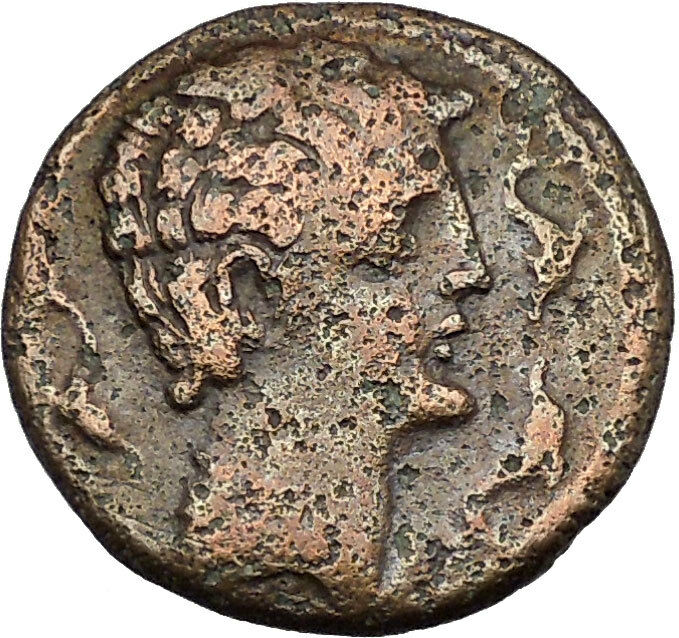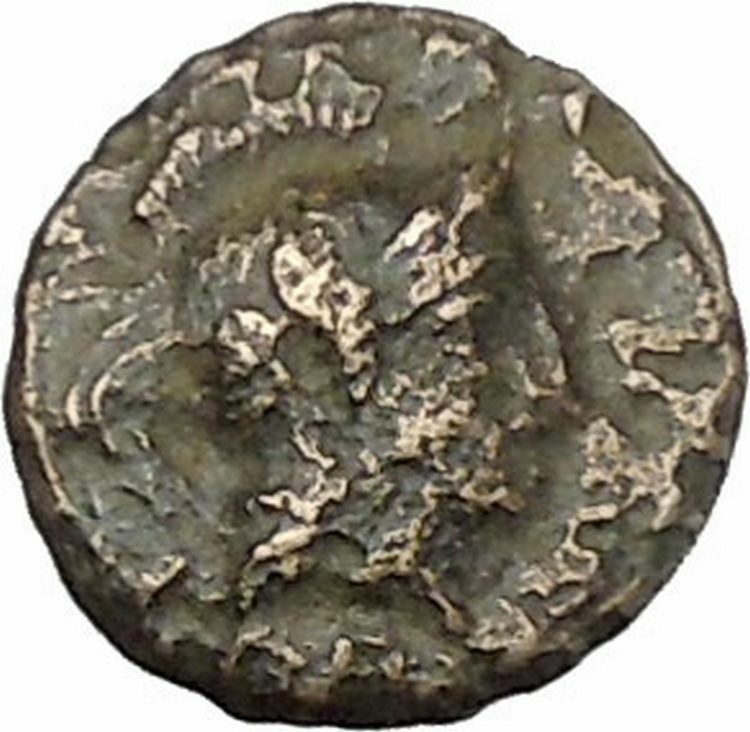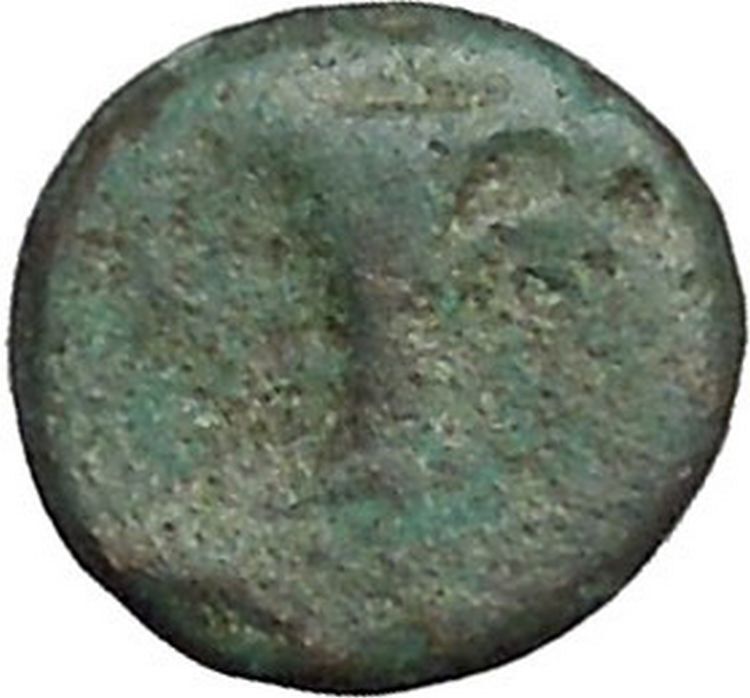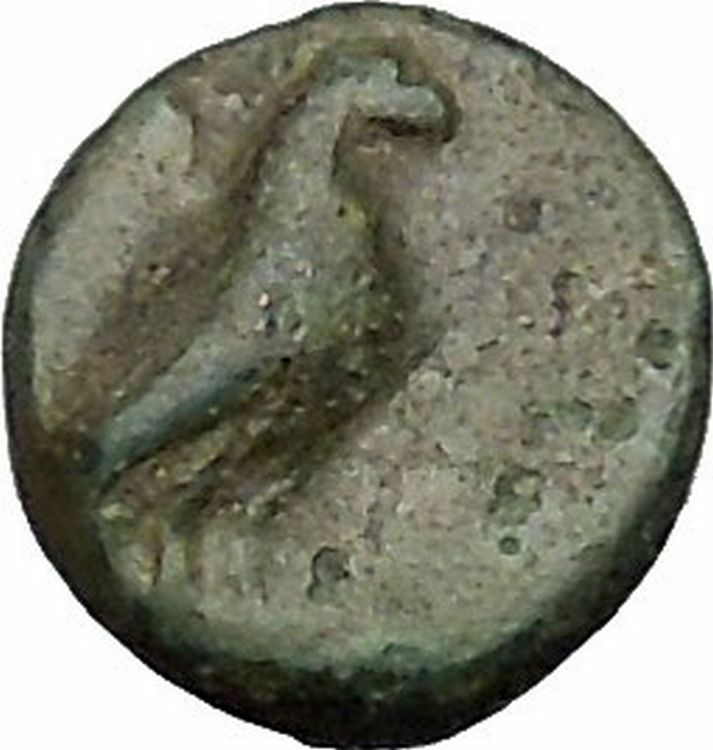|
Greek King: Philip V – King of Macedonia: 221-179 B.C.
Bronze 25mm (6.88 grams) Struck circa 221-179 B.C.
Reference: Sear 6795; Forrer/Weber 2203; SNG Copenhagen 1258v
Radiate head of Helios right.
BAΣIΛEΩΣ / ΦIΛIППOΥ above and beneath thunderbolt; monogram in field above; all
within oak-wreath.
Son of Demetrios II, Philip V
came to power in 221 B.C. on the death of Antigonos Doson. He was a vigorous
ruler and maintained the power of the Macedonian kingdom in the earlier part of
his reign. However, he made the mistake of arousing the enmity of the Romans,
and in 197 B.C. his power was crushed at the battle of the Kynoskephalai by the
Roman general T. Quinctius Flamininus. After this his power and territory were
severely curtailed by Rome, and the days of the Macedonian kingdom were
numbered.
You are bidding on the exact item pictured,
provided with a Certificate of Authenticity and Lifetime Guarantee of
Authenticity.
Helios was the
personification of the sun in
Greek mythology
.
Homer
often calls him simply
Titan
or
Hyperion
, while
Hesiod
(Theogony
371) and the
Homeric Hymn
separate him as a son of the
Titans
Hyperion
and
Theia
(Hesiod) or
Euryphaessa
(Homeric Hymn) and brother of the
goddesses Selene
, the moon, and
Eos,
the dawn. The names of these three were also the common Greek words for sun,
moon and dawn. Ovid
also calls him Titan, in fact “lumina
Titan”.

The
Emperor
Julian the Apostate
, forsook to show romans
that Helios was the only true god, and that the other roman gods were just an
image or manifestations of the supreme solar divinity, during that time the
solar monotheism was the official religion of the Roman Empire, and Sol Invictus,
was recognized as the supreme god.
Helios was imagined as a handsome god crowned with the shining
aureole
of the sun, who drove the
chariot of the sun
across the sky each day to
earth-circling Oceanus
and through the world-ocean returned to
the East at night. Homer described Helios’s chariot as drawn by
solar steeds
(Iliad
xvi.779); later Pindar
described it as drawn by “fire-darting
steeds” (Olympian Ode 7.71). Still later, the horses were given fiery
names:
Pyrois
,
Aeos
,
Aethon
, and
Phlegon
.
As time passed, Helios was increasingly identified with the god of light,
Apollo
. However, in spite of their syncretism,
they were also often viewed as two distinct gods (Helios was a
Titan
, whereas Apollo was an
Olympian
). The equivalent of Helios in
Roman mythology
was
Sol
, specifically
Sol Invictus
.
Philip V (Greek:
Φίλιππος Ε΄) (238 BC – 179 BC) was King of
Macedon
from 221 BC to 179 BC. Philip’s reign
was principally marked by an unsuccessful struggle with the emerging power of
Rome
. Philip was attractive and charismatic as
a young man. A dashing and courageous warrior, he was inevitably compared to
Alexander the Great
and was nicknamed the
darling of Hellas (Greek:
η αγάπη μου για Ελλάδα).
//
Early
life
The son of
Demetrius II
and Chryseis, Philip was nine
years old at his father’s death in 229 BC. He had an elder paternal half sister
called Apame
. His cousin,
Antigonus Doson
, administered the kingdom as
regent until his death in 221 BC when Philip was seventeen years old.
On his ascent to the throne, Philip quickly showed that while he was young,
this did not mean that Macedon was weak. In the first year of his rule, he
pushed back the Dardani
and other tribes in the north of the
country.
The
Social War
Main article:
Social War (220–217 BC)
In the Social War (220
BC–217
BC), the Hellenic League of Greek states was assembled at Philip V’s
instigation in Corinth
. He then led the Hellenic League in
battles against Aetolia
,
Sparta
and
Elis. At the same time he was able to stamp on his own authority
amongst his own ministers. His leadership during the Social War made him
well-known and respected both within his own kingdom and abroad.
First
Macedonian War
Main article:
First Macedonian War
After the Peace of Naupactus in 217 BC, Philip V tried to replace
Roman
influence along the eastern shore of the
Adriatic
, forming alliances or lending
patronage to certain island and coastal provinces such as
Lato on Crete. He first tried to invade
Illyria
from the sea, but with limited success.
His first expedition in 216 BC had to be aborted, while he suffered the loss of
his whole fleet in a second expedition in 214 BC. A later expedition by land met
with greater success when he captured
Lissus
in 212 BC.
In 215 BC he entered into a treaty with
Hannibal
, the
Carthaginian
general then in the middle of an
invasion of Roman Italy. Their treaty defined spheres of operation and interest,
but achieve little of substance or value for either side. Philip became heavily
involved in assisting and protecting his allies from attacks from the
Spartans
, the Romans and their allies.
Rome’s alliance with the
Aetolian League
in 211 BC effectively
neutralised Philip’s advantage on land. The intervention of
Attalus I of Pergamum
on the Roman side further
exposed Philip’s position in Macedonia.
Philip was able to take advantage of the withdrawal of Attalus from the Greek
mainland in 207 BC, along with Roman inactivity and the increasing role of
Philopoemen
, the
strategos
of the
Achaean League
. After sacking Thermum, the
religious and political centre of
Aetolia
, Philip was able to force the Aetolians
to accept his terms in 206 BC. The following year he was able to conclude the
Peace of Phoenice
with Rome and its allies.
Expansion
in the Aegean
Main article:
Cretan War
Following an agreement with the
Seleucid
king
Antiochus III
to capture Egyptian held
territory from the boy king
Ptolemy V
, Philip was able to gain control of
Egyptian territory in the
Aegean Sea
and in
Anatolia
. This expansion of Macedonian
influence created alarm in a number of neighbouring states, including
Pergamum
and
Rhodes
. Their navies clashed with Philip’s off
Chios
and
Lade (near
Miletus
) in 201 BC. At around the same time,
the Romans were finally the victorious over Carthage.
Second
Macedonian War
Main article:
Second Macedonian War
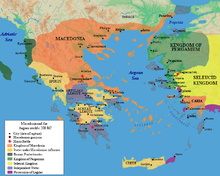
Kingdom of Macedon on the eve of the Second Macedonian War, circa
200 BC.
In 200 BC, with Carthage no longer a threat, the Romans declared war on
Macedon arguing that they were intervening to protect the freedom of the Greeks.
After campaigns in
Macedonia
in 199 BC and
Thessaly
in 198 BC, Philip and his Macedonian
forces were decisively defeated at the
Battle of Cynoscephalae
in 197 BC. The war also
proved the superiority of the
Roman legion
over the Greek
phalanx formation
.
Alliance
with Rome
Main article:
Roman–Syrian War
The resulting peace treaty between Philip V and the Romans confined Philip to
Macedonia and required him to pay 1000
talents
indemnity
, surrender most of its fleet and
provide a number of hostages, including his younger son Demetrius. After this,
Philip cooperated with the Romans and sent help to them in their fight against
the Spartans under King
Nabis
in 195 BC. Philip also supported the
Romans against Antiochus III (192 BC-189 BC).
In return for his help when Roman forces under
Publius Cornelius Scipio Africanus
and his
brother
Lucius Cornelius Scipio Asiaticus
moved through
Macedon and Thrace
in 190 BC, the Romans forgave the
remaining indemnity that he had to pay and his son Demetrius was freed. Philip
then focused on consolidating power within Macedon. He reorganised the country’s
internal affairs and finances, mines were reopened and a new currency was
issued.
Final
years
However, Rome continued to be suspicious of Philip’s intentions. Accusations
by Macedon’s neighboring states, particularly
Pergamum
, led to constant interference from
Rome. Feeling the threat growing that Rome would invade Macedon and remove him
as king, he tried to extend his influence in the
Balkans
by force and diplomacy. However, his
efforts were undermined by the pro-Roman policy of his younger son Demetrius,
who was encouraged by Rome to consider the possibility of succession ahead of
his older brother,
Perseus
. This eventually led to a quarrel
between Perseus and Demetrius which forced Philip to reluctantly decide to
execute Demetrius for treason in 180 BC. This decision had a severe impact on
Philip’s health and he died a year later at
Amphipolis
.
He was succeeded by his eldest son
Perseus
, who ruled as the last king of
Macedon
.
|







